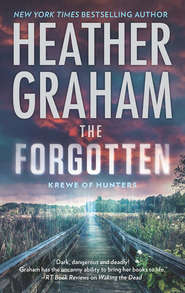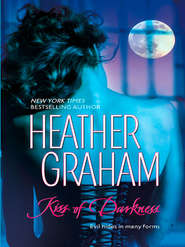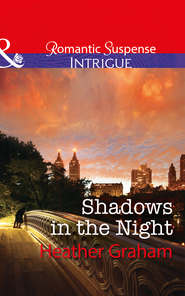По всем вопросам обращайтесь на: info@litportal.ru
(©) 2003-2024.
✖
The Séance
Автор
Год написания книги
2018
Настройки чтения
Размер шрифта
Высота строк
Поля
Too lost.
She didn’t know why, and it made her afraid. Not afraid of Granda, but just…
Afraid.
Afraid of the dead.
That night, she didn’t sleep. She lay awake, praying silently in her soul that he wouldn’t come.
And he didn’t.
She had probably just been so upset that she was imagining things.
Granda, don’t come again. Don’t ever come again. If you love me at all, please, don’t ever come again.
She told herself that all she felt was the whisper of a breeze, though there was none. A gentle touch, as if…
As if she had been heard and understood.
Her grandfather didn’t appear.
In fact, she never saw him again, not even in dreams.
And as the years passed by, slowly, certainly, she forgot.
It had only been a dream, just as her mother had said.
She was able to believe that for nearly twelve years. And then one day she learned that her grandmother’s words were true.
Seeing the dead…
Was dangerous.
1
An autopsy room always smelled like death, no matter how sterile it was.
And it was never dark, the way it was in so many movies. If anything, it was too bright. Everything about it rendered death matter-of-fact.
Facts, yes. It was the facts they were after. The victim’s voice was forever silenced, and only the eloquent, hushed cry of the body was left to help those who sought to catch a killer.
Jed Braden could never figure out how the medical examiner and the cops got so blasé about the place that they managed not only to eat but to wolf down their food in the autopsy room.
Not that he wasn’t familiar enough with autopsy rooms himself. He was, in fact, far more acquainted with his current surroundings than he had ever wanted to be. But eating here? Not him.
This morning, it was doughnuts for the rest of them, but he’d even refused coffee. He’d never passed out at an autopsy, even when he’d been a rookie in Homicide, and he didn’t feel like starting now.
Even a fresh corpse smelled. The body—any body—released gases with death. And if it had taken a while for someone to discover the corpse, whether it was a victim of natural, self-inflicted or violent death, growing bacteria and the process of decay could really wreak havoc with the senses.
But sometimes he thought the worst smells of all were those that just accompanied the business of discovering evidence: formaldehyde and other tissue preservers and the heavy astringents used to whitewash death and decay. Some M.E.’s and their assistants wore masks or even re-breathers—since the nation had become litigation crazy, some jurisdictions even required them.
Not Doc Martin. He had always felt that the smells associated with death were an important tool. He was one of the fifty percent of people who could smell cyanide. He was also a stickler; he hated it when a corpse had to be disinterred because something had been done wrong or neglected the first time around.
There wasn’t a better man to have on a case.
Whenever a death was suspicious, there had to be an autopsy, and it always felt like the last, the ultimate, invasion. Everything that had once been part and parcel of a living soul was not just spread out naked, but sliced and probed.
At least an autopsy had not been required for Margaritte. She had been pumped full of morphine, and at the end, her eyes had opened once, looked into his, then closed. A flutter had lifted her chest, and she had died in his arms, looking as if she were only sleeping, but truly at rest at last.
Doc Martin finished intoning the time and date into his recorder and shut off the device for a moment, staring at him.
He didn’t speak straight to Jed, though. He spoke to Jerry Dwyer, at his side.
“Lieutenant. What’s he doing here?”
Inwardly, Jed groaned.
“Doc…” Jerry murmured unhappily. “I think it’s his…conscience.”
The M.E. hiked a bushy gray eyebrow. “But he’s not a cop anymore. He’s a writer.”
He managed to say the word writer as if it were a synonym for scumbag.
Why not? Jed thought. He was feeling a little bit like a scumbag this morning.
Doc Martin sniffed. “He used to be a cop. A good one, too,” he admitted gruffly.
“Yeah, so give him a break,” Jerry Dwyer told him. “And he’s got his private investigator’s license, too. He’s still legit.”
This time Martin made a skeptical sound at the back of his throat. “Yeah, he got that license so he could keep sticking his nose into other people’s business—so he could write about it. He working for the dead girl? He know her folks? I don’t think so.”
“Maybe I want to see justice done,” Jed said quietly. “Maybe the entire force was wrong twelve years ago.”
“Maybe we’ve got a copycat,” Martin said.
“And maybe we got the wrong guy,” Jed said.
“Technically, we didn’t get any guy, exactly,” Jerry reminded them both uncomfortably.
“And you feel like shit for having written about it, as if the cop who was killed really did do it, huh?” Doc Martin asked Jed.
“Yeah, if that’s the case, I feel like shit,” Jed agreed.
Jerry came to his defense again. “Listen, the guy’s own partner thought he was guilty. Hell, he was the one who shot him. And Robert Gessup, the A.D.A., compiled plenty of evidence for an arrest and an indictment.” Jerry cleared his throat. “And so far, no one has been proved wrong about anything. We all know about copycats.”
“Thing about copycats is, they always miss something, some little trick,” Doc Martin said. “Unfortunately, I wasn’t the M.E. on the earlier victims. Old Dr. Mackleby was, but he passed away last summer from a heart attack, and the younger fellow who was working the case, Dr. Austin, was killed in an automobile accident. But don’t worry, if there’s something off-kilter here, I’ll find it. I’m good. Damned good.”
“Yeah,” Jerry Dwyer said, adding dryly, “Hell, Doc, we knew that before you told us.”











